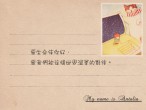
高中和大学的英文作文【一】
什么是军魂?燃烧弹在我身边爆炸,大火就在我身边燃烧起来了,我喜欢吃烤鸡腿,但害怕烤到自己,面临着自己被火烤时,我不能随便移动哪怕几公分的距离!为什么?这是上级的命令,这是我的职责!前面碉堡里机枪很是凶猛,很多战士中弹身亡,后面的战士们又冲上去,为了避免更大的伤亡,我只能堵住机枪眼,难道我不想躲过子弹硬向子弹上撞吗?我也想活者看到胜利的曙光,但这是我必须去做,这是我的使命!即使四面被围,弹尽粮绝,我们也要跟敌人撕最后一次,不惜与敌人同归与尽,因为在我们部队的传统里面没有后退一词,没有投降一词!
这就是我们中国军魂!
铁打的营盘,流水的兵。当兵的一岔接着一岔,他们手中的旗帜没有变,他们部队的传统没有变,他们的荣誉没有变,他们的使命没有变!即使面临新的战争,他们也一样打赢敌人没有二话!
是匹野马,就应该驰骋大地;
是只雄鹰,就能够搏击蓝天!
让我们肩负起新的.使命,昂首阔步于世界大国里,我们永远不会输给别人的!
每一个大学都有一个属于自己的文化,它包括每一个大学生的道德风范,精神风貌与求学理念。
曾经有一个学生高考成绩特别好,山东大学里的一个招生老师跟他联系说,只要他愿意以第一志愿报考山大,四年学费全免。在这样的利益或诱惑下,很多人也许会当即答应的,毕竟山大也错名牌了嘛,但是这位考生却说我想上北大,我上学不仅是为了学习课本上的知识,更重要的是学习这个大学的文化。
课本上的知识相对来说是的,但一个大学的文化却是活的,它就在你的身边,无时无刻不在影响着你,比如一个大学里的人都乱仍垃圾,你难道会很自觉的找垃圾桶吗?一个大学里打架的很多,当他们欺负到你的头上,你能不还手吗?一个大学里说话粗鲁,讲话很不文明,在这种环境下,你会不受影响吗?不用想也知道,上一级学生的言行举止,办事作风都无时不在影响着下一级的学生们。这种风气将传的很久很久。
改变一个大学落后的文化,的的确确是很难的,因为这已经成了风气,但并不是没有办法,它需要几代学生们的努力。我们的确不如别人,但我们同样拥有拼搏,只要我们时刻不忘追赶他们,学习他们,我们就会有机会,每一届前进那怕一点点,几年的时间,我们的理念就会大大的不一样,我们的理念从原来的松弛和懒惰变成了拼搏和追赶,这种精神就会留给我们的师弟师妹们,他们同样会接过这面精神旗帜继续前进,这就是我们的大学魂!
高中和大学的英文作文【二】
I read the Chinese version of “Camille” a few years ago. At that time I was deeply moved by the main character Marguerite Gautier. “Camille” or “The Lady of the Camellias” by Alexandre Dumas, fils, is the story of Marguerite Gautier, a young courtesan, or kept woman, in Paris in the mid 1800's, and how she falls in love with a young man, Armand Duval, and then tries to escape from her questionable past. Unfortunately, it comes back to haunt her and she ends up returning to that life and dies painfully and alone, but with the knowledge that she was a noble woman at heart. When I first began to read the book, I did not care for Marguerite or her attitude or lifestyle, but as I got further into the narrative, I realized that her saucy attitude was a front to cover the lonely woman that she really was. She felt used, abused and unloved, until the gentle Armand Duval came into her life and showed her that he loved her as a person and not for what she could do for him. It must have taken great courage for Marguerite to leave the life she had lived for so long, knowing all along that it was probably too good to be true and would not last indefinitely. And it also showed that Marguerite really loved Armand Duval for she could even change herself for him.
However, happiness didn’t last for long. When M. Duval, Armand's father, came to her, pleading for her to leave Armand to save both Armand's reputation and that of his younger innocent sister, Marguerite saw a way to become pure of heart, if not in body. She felt that it was her duty, because she loved Armand so much, to do this even though it meant giving up her own happiness and hurting Armand temporarily. She reluctantly returned to her former life, knowing that.some day Armand would forgive her. Sadly, she died in debt and basically alone, except for her one female friend, Julie Duprat, who helped her during her illness. She had her journal sent to Armand after her death, explaining why she had made the choices she had. I think Dumas's last few lines about Marguerite being the exception, not the rule were quite true, and I also agreed with his view that while her lifestyle could not be condoned, we as a society assume that all of these type of women are cold and heartless, while this may not always be the case. A person can make the wrong choices in life when they are young, and try to redeem themselves, but sometimes past situations prevent them from changing their lives, even though they desperately wish to do so. This applies to both men and women in many different types of circumstances: involvement in crime; drug or alcohol abuse; gambling; prostitution; financial problems; poor marriage choices; etc. And this is the fact, which exists in the whole society.
As far as the other characters in the book, I think Marguerite was right in saying that no one truly cared about her, but only wanted something from her, the only exceptions being Armand and Julie Duprat. Of course, the Comte de G. and Comte de N. wanted her body and appearance. The
Duke needed to “wake up and smell the coffee” and realize that she could never replace his dead daughter. If he truly cared, he could have helped her leave her lifestyle without “keeping” her himself. And lastly, Prudence was a blood-sucking leech who used Marguerite almost worse than the men. I also think she was jealous of the fact that Marguerite had so much more courage than herself and someone truly loved her.
Last morning, when tiding my bookshelf, I took this book out of the shelf, and a dried flower flew away from the book. It was pale blue, very transparent, with thin fine veins. a dried flower flew away from the book. It was pale blue, very transparent, with thin fine veins. I held it against the morning light and blew on it. The soft breeze carried it away. Camille is just like the camellia, she could never escape from the destiny of withering. But it wasn’t her fault; it’s because of the evil of Capitalism and the hideousness of that society.
Suddenly, I remembered a saying: “Women are like the flowers”. Those pretty women are like those beautiful flowers; their delicate beauty makes people feel they are the miracle of life. However, even the God envies their beauty. It seems that beautiful women always have tragic endings. As we are normal persons, even we can see the hideousness of humanity that results in their fate of withering, we can at most ask quietly in our hearts: Where have those beautiful flowers gone? Where have they gone?
The Life And Adventures Of Robinson Crusoe
It seemed to be such a coincidence that the night after I finished reading The Life And Adventures Of Robinson Crusoe, I was to dine in a restaurant distinctly related to the book itself. This restaurant was no other than the famous American-styled “Friday ’s. ” The reason for mentioning this restaurant is quite straightforward to all the gentlemen, ladies and children who have read the novel and enjoyed it, which is the fact that this restaurant was, most likely, named after the American Native in Robinson Crusoe, called Friday. This restaurant offers very exceptional service, for instance when the waitresses are asked to order dishes they kneel rather than stand, which, unlike the other restaurants I have been to, makes it easier for the customers to hear them speak. Moreover, Friday’s friendly services to the customers help them to make better choices when ordering dishes. I remembered when I went to Friday ’s last time; the waitress kindly described the items on the menu with precise details. It turned out that the combo I initially wanted was designed to be shared among a large group, not to be eaten by one person. I think this restaurant shows many commendable features similar to that of Friday. Friday brought emotional warmth to the people around him with his appealing personality. I think it was this personality that affected Crusoe and made him say that he loved Friday when Crusoe didn ’t express love for his parents, brothers, sisters, or even his wife. “When he espied me, he came running to me, laying himself down again upon the ground, with all the possible signs of an humble, thankful disposition, making many antic gestures to show it to let me know how he would serve me as long as he lived.” This was what Friday did after Crusoe had rescued him from the two savages chasing him. It was easy for me to see why Crusoe had loved Friday. After sometime, Crusoe and Friday were to rescue Friday’s father. When Friday reunited with his father, the scene was easy to move anyone: “It would have moved anyone to tears to have seen how Friday kissed him, embraced him, hugged him, cried, laughed, halloed, jumped about, danced,
sung; and then sung and jumped about again, like a distracted creature. It was a good while before I could make him speak to me.” This is my favourite chapter in the whole book. It is hard to see why Friday is an ex-savage when he can have personalities more praiseworthy than many civilized people, viz. Crusoe himself. “When he (Friday went to him (Friday’s father, he would sit down by him, open his breast, and hold his father’s head close to his bosom, half an hour together, to nourish it; then he took his arms and ankles, which were numbed and stiff with the binding, and rubbed them with his hands.” Furthermore, Friday’s expression of loyalty in asking Crusoe to kill him rather than leave him is more heartfelt than anything Crusoe ever says or does.
Crusoe, on the absolute contrary, seems incapable of deep feelings, as shown by his account of leaving his family—he never shows any emotions. After a moving lecture from Robinson’s father about his future, he still decided to follow his own wandering ambition. Careless was he about the wishes of his parents to keep him alive and prosperous, as he was the only child left in the family. When he came back from the island which he had lived on for twenty eight years, he found that it had been too late to tell his parents that he was still alive, but yet again he did not feel sorry for them; he also did not feel sorry for the two people who had to live in misery for nearly thirty years under the allusion all of their sons were dead. He had the same feelings for his wife: when he was married, he said it was “not either to my disadvantage or dissatisfaction”, implying that it was also neither to his advantage nor his satisfaction. Moreover, after his wife died, Robinson did not think of looking after the three children they had, but went back to the island, which he had lived on for twenty-eight years. It was on this trip which Robinson Crusoe revisited “His Island ” as he called it. I feel that Robinson ’s indifference to his family is almost emotionally cruel.
Before had clearly shown the contrast between Crusoe’s and Friday’s personalities, as when Friday, in his joyful reunion with his father, displayed far more emotion toward his family members than Crusoe, whereas Crusoe never mentions missing his family or dreams about the happiness of seeing them again. I think Defore is very successful in introducing Friday as part of the novel, it makes the whole novel seem much more complete and gripping to the reader, as well as proving that Defoe’s ideology of racism is civilized unlike many other Europeans at that time; natives and savages are not worse than others but can perhaps even be more modern and civilized. Those are the reasons of why I like The Life And Adventures Of Robinson Crusoe and Friday.
高中和大学的英文作文【三】
坐自己的位置错了吗?一句话三言两语足以评估这个人的素质的高低,文明,礼让,友爱都能触类旁通的词语,从小就伴着我们成长,怎么连大学生读了十几年的书也理解不了这只言片语呢,是想你的父亲或母亲重病站在车上无人让座,就能请求你别拒绝就行了,一下子就凉到北极去了,社会需要关爱的人需要相互扶持,你的一个举动不仅帮助别人,也能升华自己,何乐而不为呢?
再者,大学生文化素质高的情况下,却出现行为素质低的现象,我们不应该反思点什么吗?当今这个世界为什么会出现这种状况?难道真的仅仅只是因为人们所认为的`:学生情商低下吗?为现代化社会能高速发展各类学校,积极主动大力培养各类人才回报社会,而教育部门心系人才驿站则是哪间学校哪位同学进了名牌大学,大肆夸奖,这间学校老师家新校长升职如此恶性循环,小学阶段的三字经,有的人是想找对,好久下雨我去了,一心只愿考取功名了。因此,教育者应尊重育人先育德这一规律,不然未来的社会就如同机器人社会,唯科技,绝人情。
曾经上网看到这么一个段子,现在的社会是怎么了?回想起六七十年代那个时候一家便宜,四家长,家家户户门挨着门后,最后有多少家产,门口一览无遗,晚上睡觉门也敞开着,别说别说晚风有多清凉了,再看看这个时代,恨不得多加一把锁呢,科技在不断发展,勇往直前,我们怎么能倒退呢?并不是你的双腿在倒退,是你的精神在回头走。
雷锋的精神一直被人们赞颂,他的热心,无私,伟大,令人们赞叹不已,他学习一直不行,努力了也跟不上,但他的口碑胜于多少科技,多少人才,只因他有一颗善良的心,每每人们问他为什么的时候,他只会笑笑说,群众的快乐是我最大的快乐,助人与助剂,社会不断的需要钱,更需要情。
我们应该携手共创一个美好有爱的社会,而不应该是一个令人不开心的世界。
高中和大学的英文作文【四】
This is a story about a special and unreserved woman who has been exposed to a hostile environment but continuously and fearlessly struggling for her ideal life. The story can be interpreted as a symbol of the independent spirit.
It seems to me that many readers’ English reading experience starts with Jane Eyer. I am of no exception. As we refer to the movie “Jane Eyer”, it is not surprising to find some differences because of its being filmized and retold in a new way, but the spirit of the novel remains----to be an independent person, both physically and mentally.
Jane Eyer was a born resister, whose parents went off when she was very young, and her aunt,the only relative she had,treated her as badly as a ragtag. Since Jane’s education in Lowwood Orphanage began, she didn’t get what she had been expecting——simply being regarded as a common person, just the same as any other girl around. The suffers from being humiliated and devastated teach Jane to be persevering and prize dignity over anything else.As a reward of revolting the ruthless oppression, Jane got a chance to be a tutor in Thornfield Garden. There she made the acquaintance of lovely Adele and that garden’s owner, Rochester, a man with warm heart despite a cold face outside. Jane expected to change the life from then on, but fate had decided otherwise: After Jane and Rochester fell in love with each other and got down to get marry, she unfortunately came to know in fact Rochester had got a legal wife, who seemed to be the shadow following Rochester and led to his moodiness all the time ----Rochester was also a despairing person in need of salvation. Jane did want to give him a hand, however, she made up her mind to leave, because she didn’t want to betray her own principles, because she was Jane Eyer. The film has finally got a symbolist end: Jane inherited a large number of legacies and finally returned. After finding Rochester ’s misfortune brought by his original mad wife, Jane chose to stay with him forever.
I don’t know what others feel, but frankly speaking, I would rather regard the section that Jane began her teaching job in Thornfield as the film’s end----especially when I heard Jane’s words “Never in my life have I been awaken so happily. ” For one thing, this ideal and brand-new beginning of life was what Jane had been imagining for long as a suffering person; for another, this should be what the audiences with my views hoped her to get. But the professional judgment of producing films reminded me to wait for a totally different result: There must be something wrong coming with the excellence----perhaps not only should another section be added to enrich the story, but also we may see from the next transition of Jane’s life that “Life is like a box of chocolates, you never know what you would get.”
What ’s more, this film didn’t end when Jane left Thornfield. For Jane Eyer herself, there should always be somewhere to realize her great ideal of being independent considering her fortitude, but for Rochester, how he can get salvation? The film gives the answer tentatively: Jane eventually got back to Rochester. In fact, when Jane met Rochester for the first time, she scared his horse and made his heel strained, to a certain extent, which meant Rochester would get retrieval because of Jane. We can consider Rochester’s experiences as that of religion meaning. The fire by his frantic wife was the punishment for the cynicism early in his life. After it, Rochester got the mercy of the God and the love of the woman whom he loved. Here we can say: human nature and divinity get united perfectly in order to let such a story accord with the requirements of both two sides. The value of this film may be due to its efforts to explore a new way for the development of humanism under the faith of religion.
高中和大学的英文作文【五】
Many people simply regard Pride and Prejudice as a love story, but in my opinion, this book is an illustration of the society at that time. She perfectly reflected the relation between money and marriage at her time and gave the people in her works vivid characters. The characters have their own personalities. Mrs. Bennet is a woman who makes great efforts to marry off her daughters. Mr. Bingley is a friendly young man, but his friend, Mr. Darcy, is a very proud man who seems to always feel superior. Even the five daughters in Bennet family are very different. Jane is simple, innocent and never speaks evil of others. Elizabeth is a clever girl who always has her own opinion. Mary likes reading classic books. (Actually she is a pedant. Kitty doesn’t have her own opinion but likes to follow her sister, Lydia. Lydia is a girl who follows exotic things, handsome man, and is somehow a little profligate. When I read the book, I can always find the same personalities in the society now. That is why I think this book is indeed the representative of the society in Britain in the 18th century.
The family of gentleman in the countryside is Jane Austen’s favourite topic. But this little topic can reflect big problems. It concludes the stratum situation and economic relationships in Britain in her century. You can find these from the very beginning of this book.
The first sentence in this book is impressive. It reads: “It is a truth well known to all the world that an unmarried man in poss ession of a large fortune must be in need of a wife”. The undertone is very clear: the foundation of the marriage at that time is not emotion but possession.
People always think that Austen was an expert at telling love stories. In fact, the marriage in her book is not the result of love, but the result of economic needs. After reading this book, I know the truth is that a poor woman must be in need of a husband, a wealthy man.
I couldn’t forget how eager Mrs. Bennet wants to marry off her daughte rs. If you want to know why she is so crazy about these things, I must mention the situation in Britain at that time. Only the eldest son had the privilege of inheriting his father’s possessions. Younger sons and daughters who are used to luxurious lives have no choice but marry a man or woman in possession of a large fortune to continue their comfortable lives. Thus, we can see that getting married is a way to become wealthier, particularly for women without many possessions. Jane Austen told us that money and possession determined everything, including marriage and love in her century.
In “Pride and Prejudice”, the sister of Mr. Bingley strongly opposed his plan of marrying Jane because the Bennets don’t have many possessions and their social positions are much lower than them. From this, we can see there are a lot of obstacles for a not very rich woman to marry a wealthy husband. The society, the relatives would not allow them to get married.
In modern society, although the marriages of economic needs have decreased rapidly, the concept of “money determines everything” is still rooted in some people’s mind. A lot of parents try hard to interfere their children’s marriages. Education background, possessions, jobs remains the main reason that may influence one’s marriage. Marry for money is still a big problem in our
society. We can’t help thinking: can money determine everything?
Austen left this problem for us to think. The genius of Jane Austen lies in this perfect simplicity, the simplicity that reflects big problems. Although Austen was only 21 when she wrote “Pride and Prejudice”, her sharp observation of social lives makes the style of this book surprisingly mature and lively. The plots in her works are always very natural. The development of the plot is as inevitable as a problem in mathematics. I think the depth of Pride and Prejudice is the reason that makes this book prominent and classic. Today, her book still can be the guide telling us the economic relationships both at her time and in modern time.



















